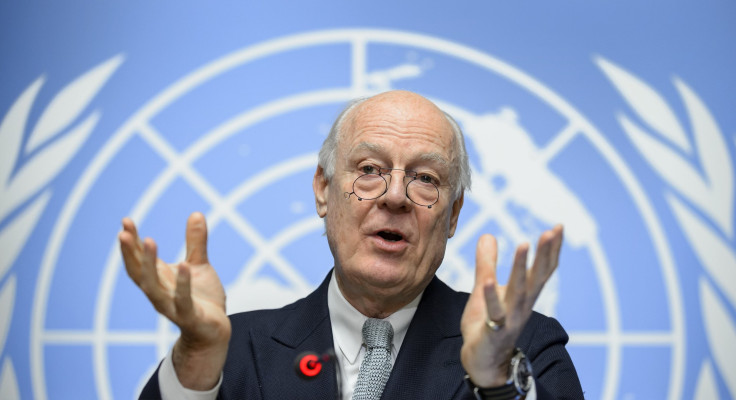Syria Conflict: UN-Brokered Peace Talks Delayed Amid Territorial Advances By Pro-Assad Forces

Fraught negotiations seeking to end the protracted and violent conflict in Syria are slated to begin Friday and are expected to last for six months, Staffan de Mistura, the United Nations’ special envoy for Syria, said Monday. The announcement comes at a time when Syrian government forces, aided by Russian airstrikes, are making significant advances in the war-torn nation.
“In terms of vision, things may get faster, things may get slower, I can tell you in advance, don’t be surprised,” de Mistura said, during a press conference in Geneva Monday, when the talks were originally scheduled to begin. “There will be a lot of posturing, we know that, a lot of walk-outs and walk-ins because a bomb has fallen or because someone has done an attack, and you will see that happening.”
De Mistura also declined to say who would be invited to represent the opposition — a key sticking point as many opposition groups have signaled that they might boycott the talks if Russia doesn’t halt airstrikes — or mention what would happen to Syrian President Bashar Assad.
However, he clarified that militants of Al-Nusra Front and the Islamic State group, also known as ISIS, would not be included in the peace talks — the first in two years — or be part of any ceasefire agreement.
Saudi Arabia has assembled a coalition of several Syrian opposition groups that are expected to meet in Riyadh Tuesday to discuss participating in the talks. Russia has called for a separate opposition delegation, which many allege is filled with groups too close to the Syrian government.
Meanwhile, Turkey has said it will withdraw its support for the talks if the opposition bench includes a representative of a Syrian Kurdish group.
Russia, which has remained Assad’s staunchest ally during the five-year conflict that has so far killed nearly 300,000 people and forced over 4 million to flee the nation, has long insisted that curbing the spread of ISIS is far more important than a political transition in Syria. On the issue of Assad’s political future, the U.S. and its allies insist that the embattled leader must leave office for the peace process to progress, while Russia and Iran disagree, stating that only Syrian voters should have the right to decide his fate.
Russia also launched a campaign of airstrikes in Syria late September, which it claims targets only ISIS strongholds. The U.S. and its allies, however, have accused Moscow of also targeting rebels fighting Assad's forces.
“There are political risks. But those political risks, and tensions and positioning and prepositioning should be also taking into account that our line is, and the Security Council has been clear, no pre-conditions at least to start it off and while the talks start,” de Mistura said. “The rest is open. It’s going to be uphill. They are not in an agreement yet, but we are all feeling ... that the time has come to at least try hard to produce an outcome.”
© Copyright IBTimes 2024. All rights reserved.






















